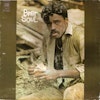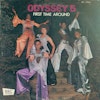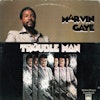Melvin Van Peebles is on the cover of Brer Soul looking like a runaway slave. He is the new Negro. Not the idealistic, early twentieth-century new Negro of the Harlem Renaissance, but a new new Negro—emboldened, embattled-emerging from the rubble of the second Civil (Rights) War. It is a reminder to all the soul, doo-wop, and shoo-bop of the times that this is who you are, brother. All that “dancing in the streets” is well and good, but you can’t shuffle past reality. Junkies, prisons, prostitutes, war—this is the world of Brother Soul, master instigator and cultural provocateur, the Brer Rabbit of a revival of the African oral tradition. The stylistic influences are the streetwise French folktales of Aristide Bruant, which Van Peebles learned while living abroad and adapted upon his return to the States. “When I came back, I was shocked by the fact that [in] the political movements, there were no Black songs,” says the auteur in his 2005 film biography, How to Eat Your Watermelon in White Company (and Enjoy It). “I mean, there was ‘We Shall Overcome,’ but there weren’t songs describing the conditions they were dealing with...things that mirrored the Black Experience.”
It was an experience—literally, the souls of Black folks—that had been “hijacked musically,” so like any good revolutionary, Van Peebles snatched back. The narrative was his weapon of choice. Stories are spoken and sung as a voice for the voiceless, indecipherable upon first listens, but you know it’s the right tune. “Take your hands off me, mister!” We're not jumping, or flinching. Still here after what they did to Martin, Malcolm, and Medgar, so we're not going anywhere—just looking out the window to pick up a little breeze. After all, it was your folks who foreclosed on the air conditioner. See, if there’s one thing whitey wants, it’s to think about just how much we're suffering. Listen to Brer Soul tell it straight. New Negro Madlib hears it. Gil Scott-Heron did too. The latter is often credited as the architect of modern-day rap, but before Small Talk at 125th and Lenox, there was Richie Havens and Langston Hughes, Nina Simone and Oscar Brown Jr. And there was Melvin Van Peebles as Brer Soul—author, filmmaker, singer, and shit-talker supreme. He is the original Ol’ Dirty Bastard, with no father to his style, and a patriarch of future generations. Free Huey.


